
 21 minutes read
21 minutes read
Let's be honest. The pitch for going freelance is seductive: control your schedule, pick your clients, and finally bill what you're worth. The reality? Spending half your week sifting through vague job postings, fighting a race-to-the-bottom on pricing, and wondering if that "urgent project" is just another dead end.
I've been there. Before scaling my own legal tech venture, I built my career on freelance gigs, navigating every platform you can imagine. I’ve seen the shiny marketplaces promising six-figure projects and the glorified classifieds that felt like a digital time warp. Some were game-changers; others were a colossal waste of time and application fees.
So, if you’re tired of the endless scroll and the generic advice, you’re in the right place. This isn't another fluffy listicle. It’s a battle-tested breakdown of the 12 best platforms for finding high-quality freelance attorney jobs, complete with the unfiltered truth about who they're for and what to watch out for. Knowing how to effectively list your self-employment on your resume is half the battle, but picking the right battlefield is what gets you paid. Let's talk about what actually works.
Okay, a bit of self-aware horn-tooting to start. (Toot, toot!) Before you roll your eyes, hear me out. While the name screams "paralegals," we’ve become a go-to for small to mid-sized firms needing to scale their legal support without mortgaging the office ping-pong table. This includes sourcing junior attorneys for specific, project-based work.
It’s not another sprawling freelance bazaar. It’s a curated talent platform built for U.S. law firms that need qualified, remote legal pros now. Think of it as your on-demand pipeline for pre-vetted paralegals, legal assistants, and attorneys, ready to integrate into your workflow almost immediately.
The secret sauce? A ruthless four-step vetting process that filters out the noise before it ever hits your inbox. This saves you from the soul-crushing task of sifting through hundreds of unqualified applicants. You get a custom shortlist in as little as 24 hours.
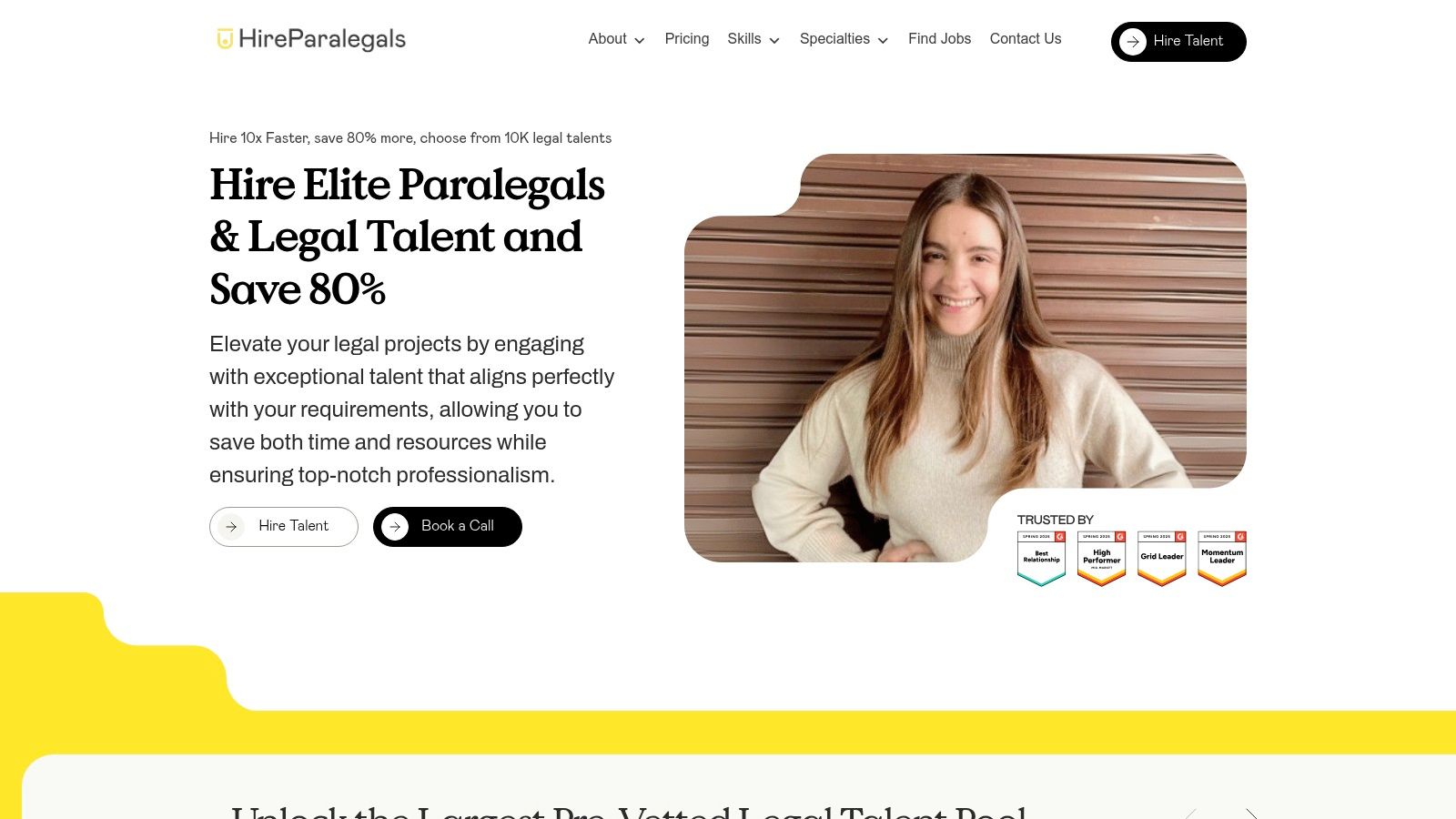
We built this because we were sick of the alternatives. HireParalegals nails the trifecta of speed, cost-efficiency, and specialization. While we offer access to talent across fields like immigration, litigation, and IP, our laser focus on U.S. law firms means every candidate gets the unique demands of the American legal system. The claim is that clients save up to 80% on payroll—a number that's hard to ignore when every dollar counts. This makes it a no-brainer for finding skilled support for doc review, case management, and legal research without committing to a full-time hire. For those seeking freelance attorney jobs, we provide a steady stream of serious clients.

The Bottom Line: HireParalegals combines AI matching with actual human oversight to deliver a vetted shortlist of timezone-aligned candidates in about a day. It cuts hiring friction and cost. We’re not saying we’re perfect. Just more accurate more often.
| Strengths | Limitations |
|---|---|
| Speed & Efficiency: Delivers a pre-vetted shortlist of candidates within 24 hours, dramatically accelerating the hiring process. | Supervision Required: Remote professionals cannot replace licensed U.S. attorneys for regulated tasks and require proper supervision. |
| Significant Cost Savings: Access to talent with salaries starting around $10/hr, leading to major reductions in payroll expenses. | Limited Public Credentials: The platform relies on its internal vetting and client ratings rather than third-party awards. |
| Rigorous Vetting: A comprehensive four-step screening process ensures high-quality, experienced candidates. | Scope of Practice: Primarily for support roles; firms must ensure compliance with state bar rules on the unauthorized practice of law. |
| Specialized Focus: Exclusively serves U.S. law firms, ensuring candidates have relevant legal exposure. |
Best for: Solo practitioners, mid-sized law firms, and corporate legal departments needing to quickly and affordably scale their legal support staff with pre-vetted remote talent.
Website: https://hireparalegals.com
Designed by attorneys for attorneys, LAWCLERK gets the details right. It’s not a chaotic job board; it's a structured, project-based platform where law firms delegate specific tasks to vetted freelance lawyers. Think of it as your on-demand, highly specialized legal team for everything from a single research memo to ongoing litigation support.
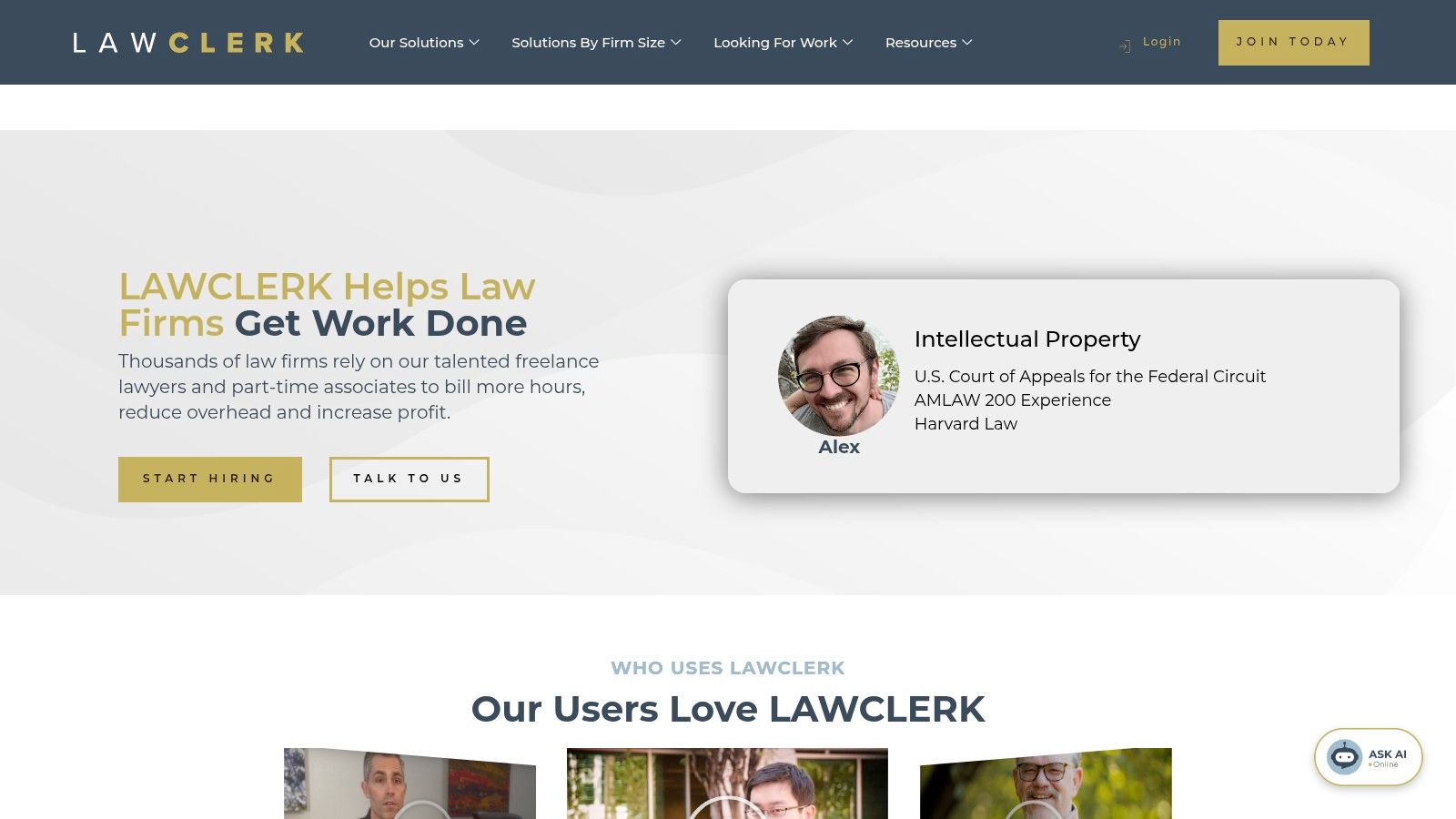
What makes it a winner? LAWCLERK bakes ethics compliance directly into its workflow. With built-in conflict checks and a platform-wide NDA, it solves major administrative headaches before you even start billing. For freelancers, the pricing is refreshingly transparent: the flat-fee you see on a project is exactly what you take home. No hidden fees, no confusing percentages. For real.
Website: https://www.lawclerk.legal
Backed by the legal recruiting powerhouse Major, Lindsey & Africa, Hire an Esquire has that staffing-agency-meets-tech-platform vibe. It’s a nationwide network connecting law firms and in-house departments with vetted contract attorneys. This isn't just a list of jobs; it offers instant match recommendations and a full suite of built-in tools for timekeeping and invoicing.
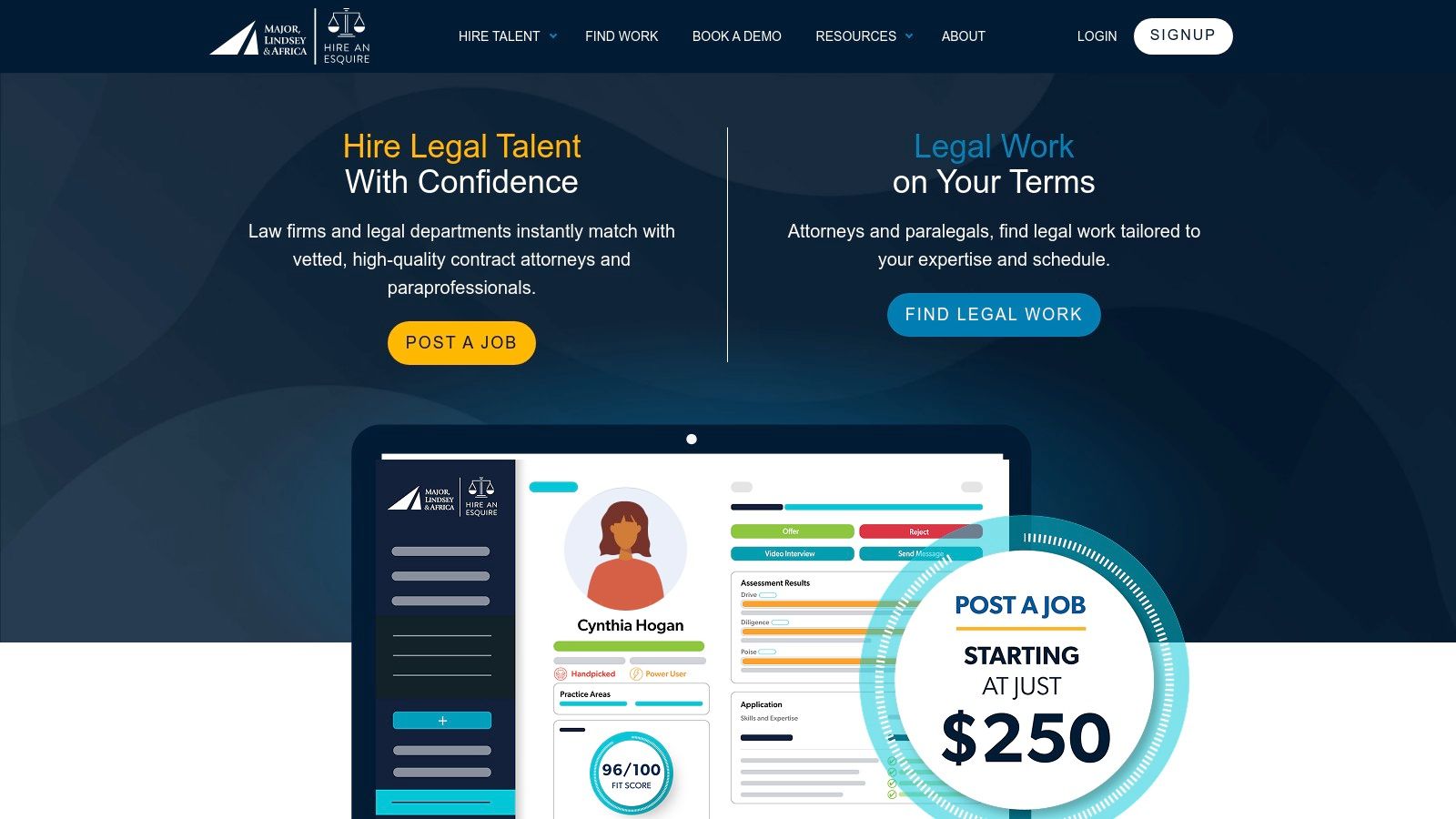
What I like is the transparency for employers, showing metrics like average applications per post and time-to-offer. This data-driven approach, combined with the credibility of its parent company, creates a curated, serious environment. Translation for freelancers? You're applying for well-defined freelance attorney jobs from clients who are actually invested in hiring, not just window shopping.
Website: https://www.hireanesquire.com
UpCounsel pitches itself as the premium marketplace for businesses, especially startups and SMBs, to find top legal talent. Forget the low-bid proposals. This platform is for experienced attorneys who want substantial freelance attorney jobs without the firm overhead. It’s an invite-only network where you set your own rates and deal directly with clients who need serious business law expertise, from IP to M&A.

The real differentiator? The client quality. These aren't just one-off gigs for a quick contract review; they're often significant, ongoing engagements from funded startups and established businesses. While you keep 100% of your rate, the platform uses a transaction fee and requires an initial subscription to join. This pay-to-play model filters for serious pros on both sides of the marketplace. For more perspective, you can find info about freelance legal jobs on hireparalegals.com.
Website: https://www.upcounsel.com/for-attorneys
Priori Legal is where in-house legal teams go shopping for vetted, top-tier talent. This isn’t an open marketplace; it's a curated talent network connecting companies with highly qualified attorneys for everything from project work to interim general counsel roles. If you’re an experienced lawyer tired of the race-to-the-bottom bidding wars, Priori’s selective, match-making approach is a breath of fresh air.
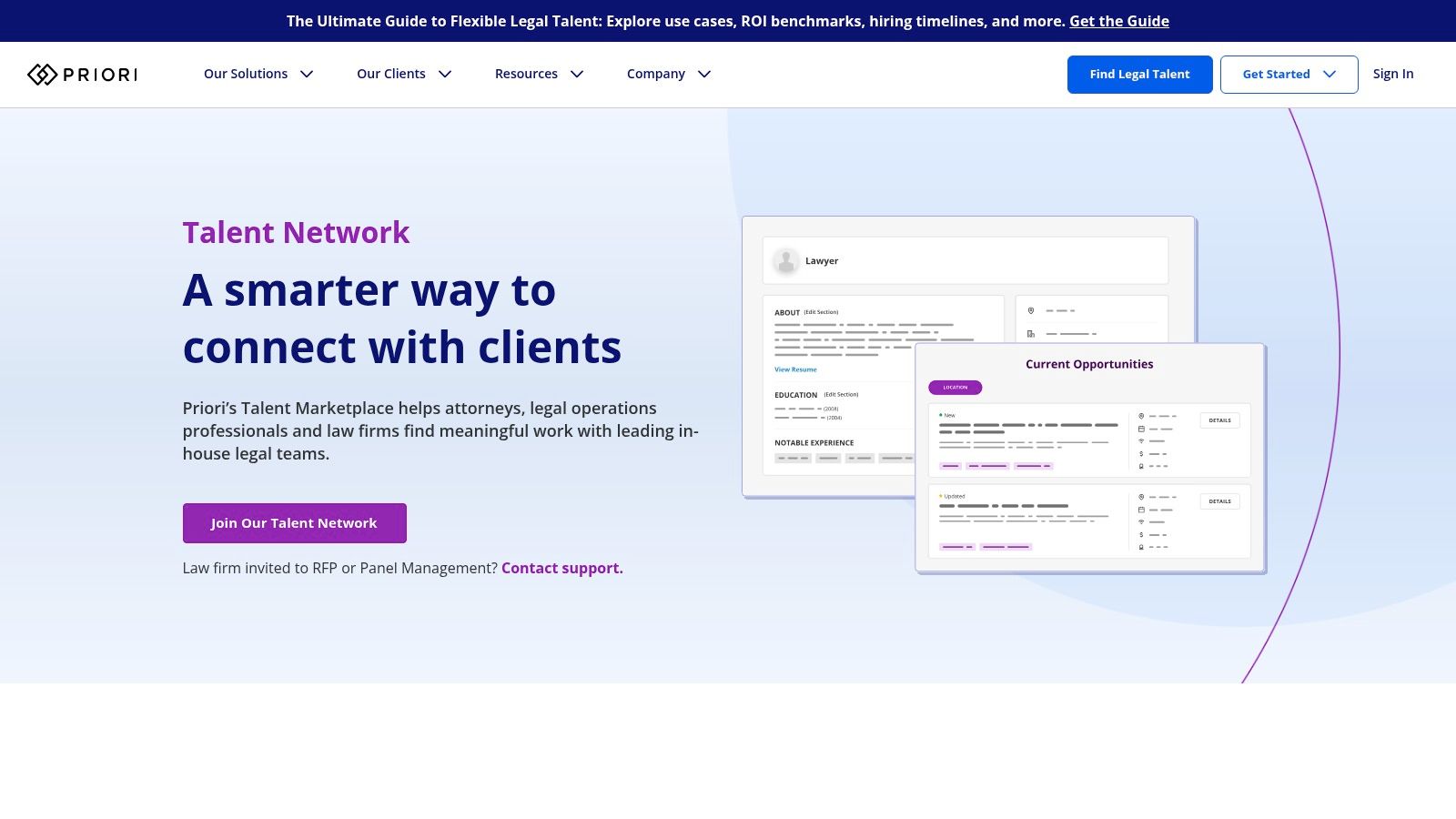
The big difference here? No public bidding. At all. Priori uses its algorithm to present clients with a shortlist of ideal candidates. This focus on curated matching elevates the entire experience, positioning freelance attorney jobs as high-value engagements, not gig-work commodities. It’s a system built for quality over quantity, which attracts sophisticated clients and serious lawyers.
Website: https://www.priorilegal.com/our-attorney-network/
Axiom basically invented the high-end, flexible legal talent model. This isn’t a job board. It’s a managed legal services provider that connects experienced, in-house-caliber attorneys with Fortune 500s and high-growth companies. Think of it as the place to land a temporary General Counsel role, not a one-off research task.
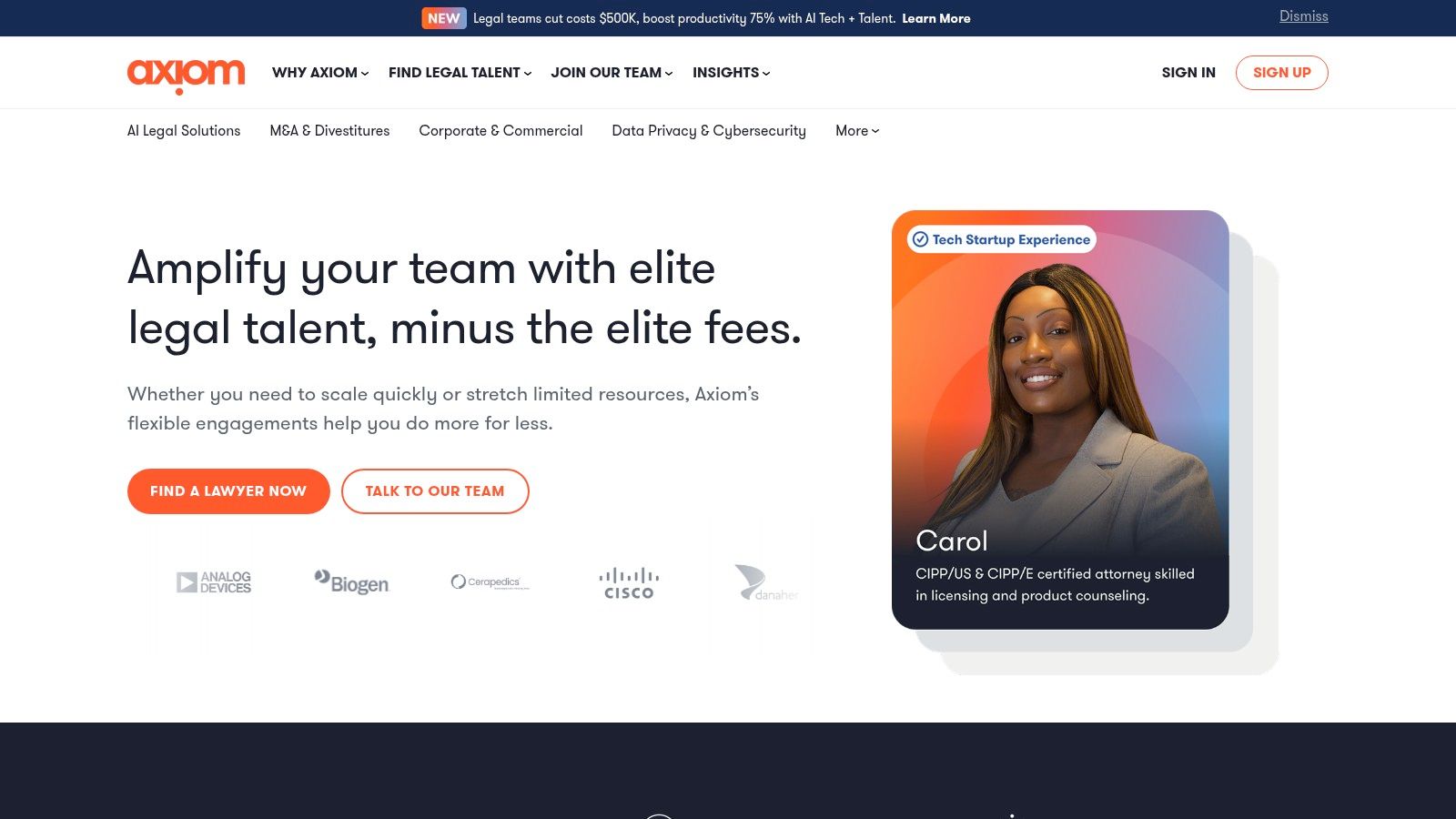
What makes Axiom stand out is its ruthless vetting process and the enterprise-level nature of its gigs. Getting into Axiom’s talent pool is tough, but if you make it, you get access to a stream of sophisticated freelance attorney jobs that often feel like long-term secondments. They focus on embedding talent into client teams, providing a stability that project-based marketplaces can't match.
Website: https://www.axiomlaw.com
Leaning more towards a modern talent network than a classic job board, Legal.io is where in-house and tech-forward legal teams go hunting. This platform specializes in connecting businesses with freelance attorneys for contract, fractional, and even permanent roles. Its sweet spot? Commercial, privacy, and product counsel. It's less about one-off memos and more about finding an embedded, flexible legal pro for a specific business need.
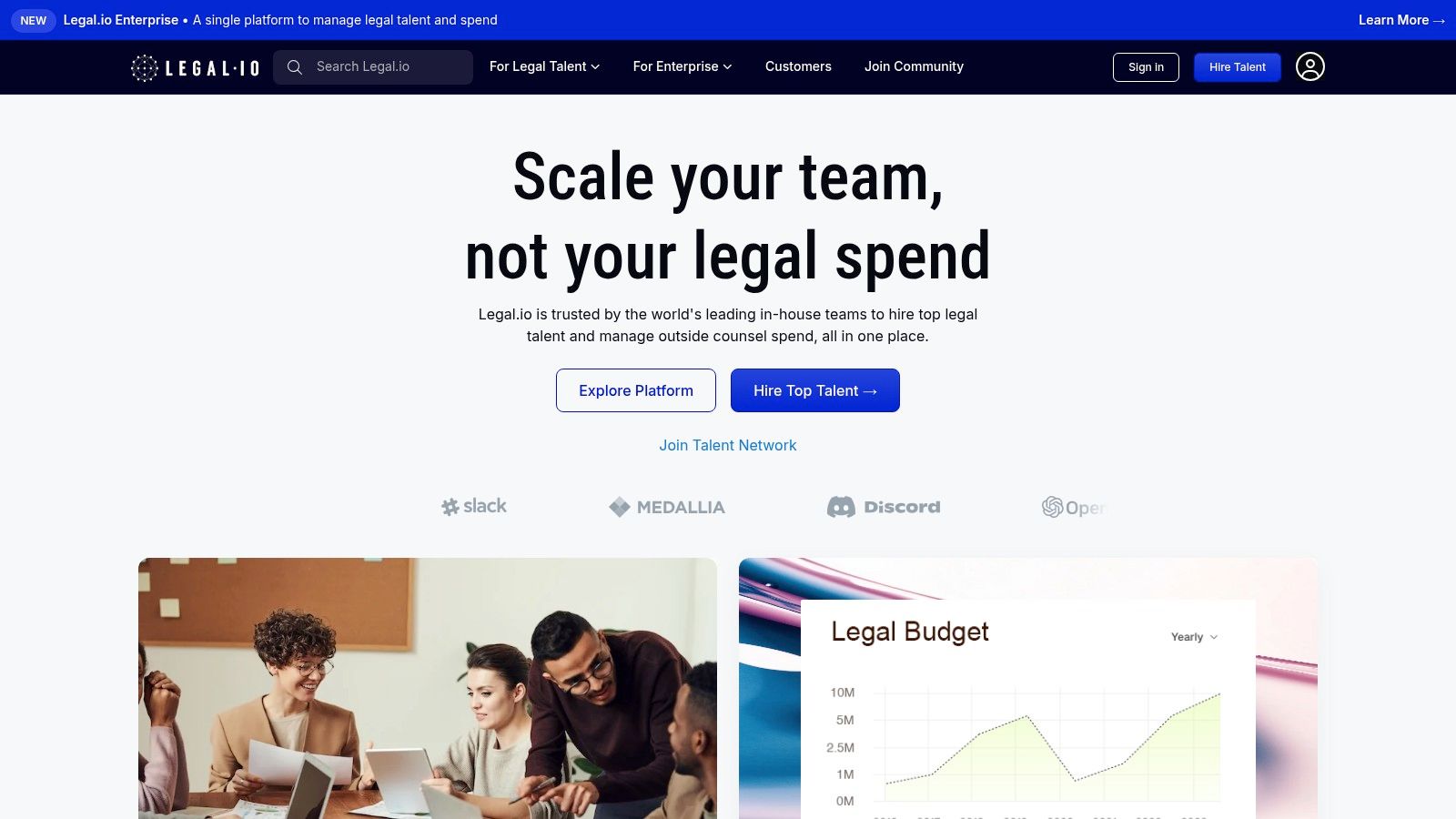
Here's the kicker: Legal.io doesn't just post jobs; it provides market intelligence. Many listings come with transparent hourly ranges and salary benchmarks, taking the guesswork out of pricing. For any attorney tired of bidding blind, this data is gold. It ensures you’re not accidentally lowballing yourself on a high-stakes tech contract review.
Website: https://www.legal.io
If traditional freelance platforms feel too small-scale, Elevate Flex operates at an enterprise level. It’s less a job board and more a strategic legal resourcing partner for corporate legal departments and large firms needing interim talent or document review teams. Think of it as the go-to for deploying vetted legal pros quickly for complex, high-stakes work.
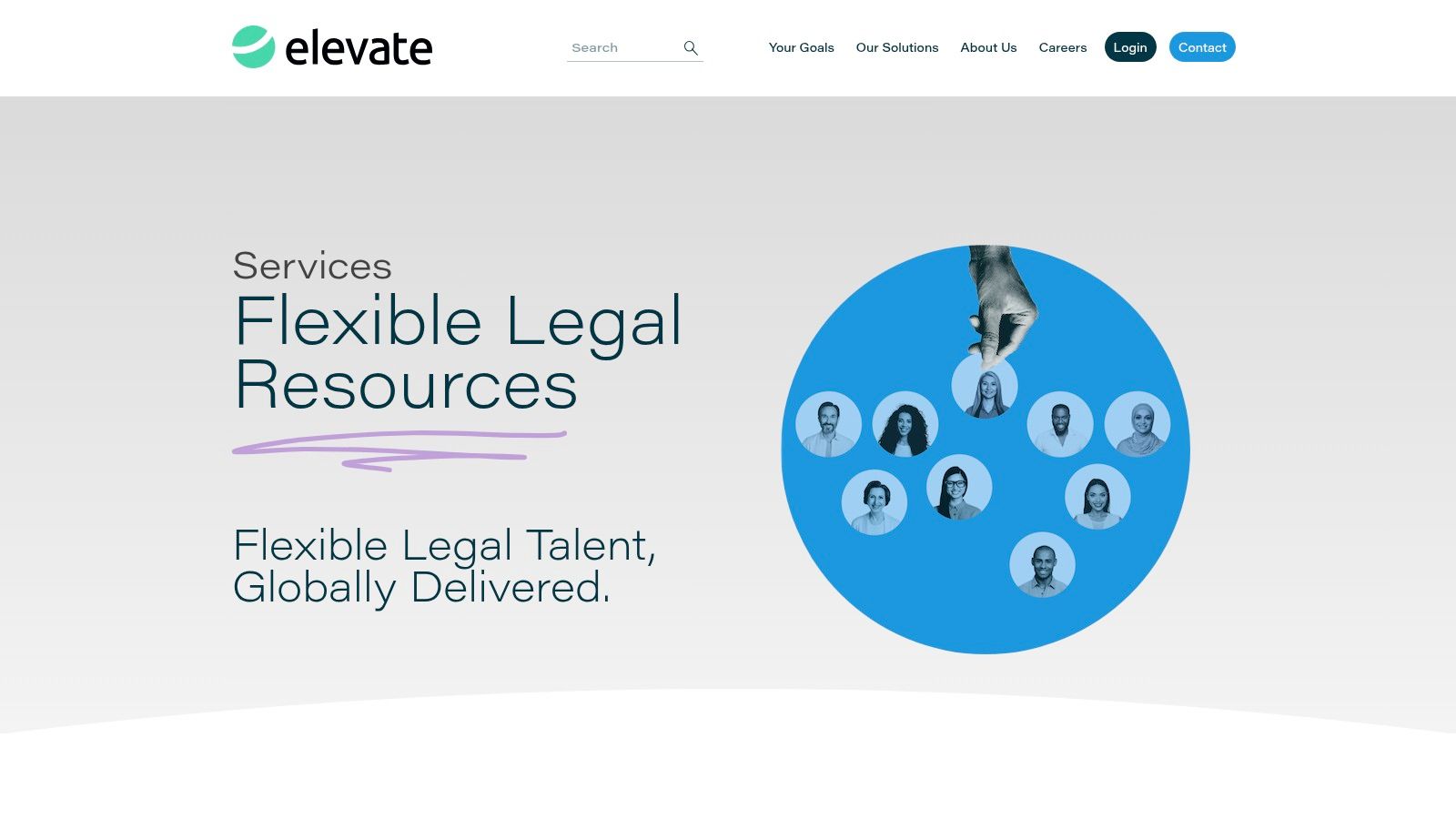
What makes it stand out? Speed and scale. Elevate Flex claims it can produce screened résumés in about 12 hours and assemble entire review teams in 48. With a massive global community of over 18,000 experts, it’s built to handle demands that would crush smaller platforms. For freelance attorneys with a strong BigLaw or in-house background, this is where you find sophisticated, often longer-term freelance attorney jobs that match your pedigree.
Website: https://elevate.law/elevateflex/
For attorneys whose ideal freelance gig is large-scale document review, Consilio is an industry heavyweight. This is not a quaint freelance marketplace; it's a major global provider of eDiscovery and legal talent solutions. Think of it as the source for the massive, often multilingual, document review projects that big litigation and investigations demand. If you're looking for project-based work that values meticulousness and stamina, this is your portal.
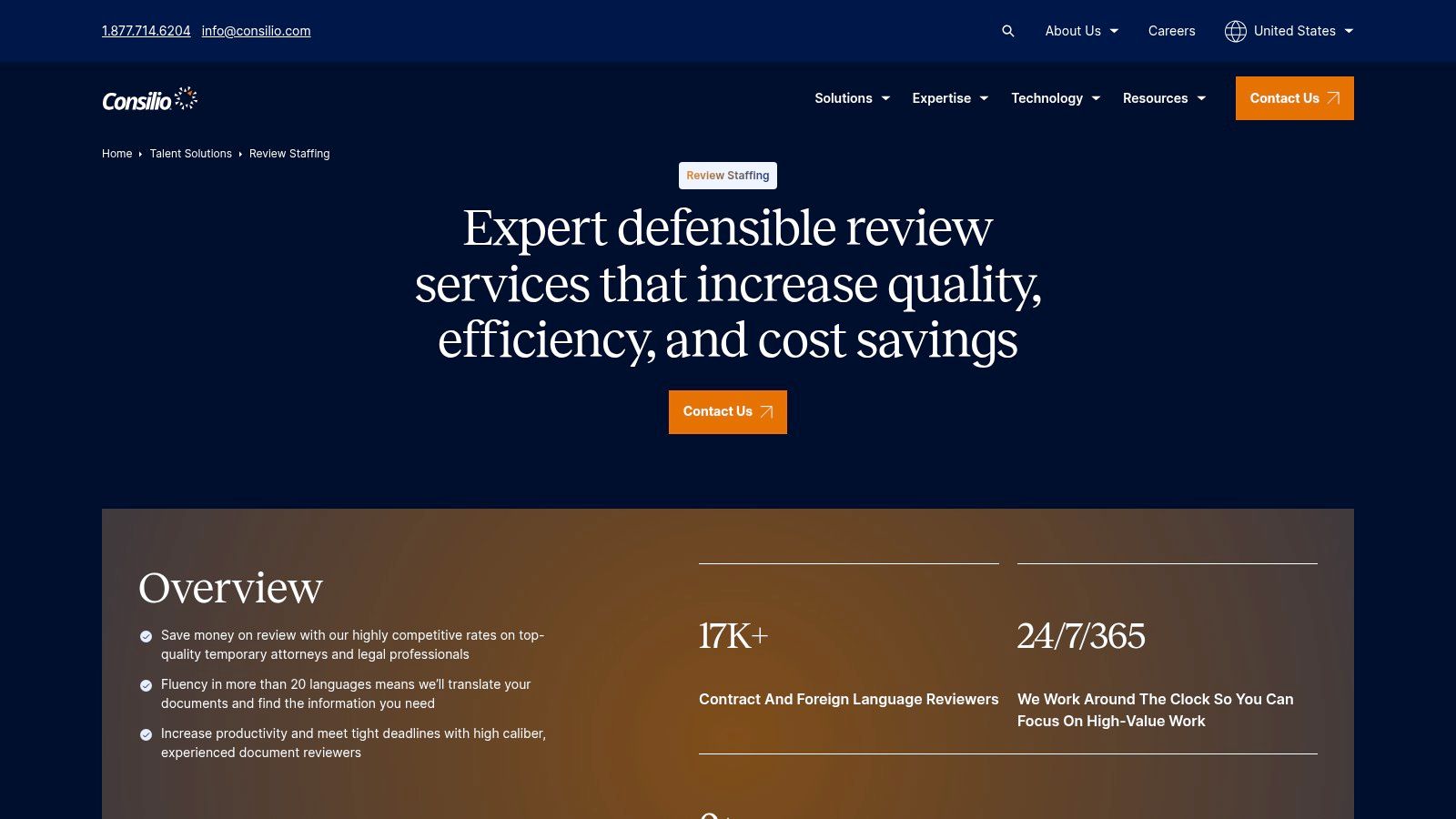
Consilio's power is its sheer scale and operational capacity. With a pool of over 17,000 contract reviewers and 24/7 operations, it can staff projects of immense size. This scale often means a more consistent stream of freelance attorney jobs compared to smaller platforms, especially if you have specialized language skills. It's the engine room of modern discovery.
Website: https://www.consilio.com/solutions/talent-solutions/review-staffing
Latitude Legal is not your typical freelance job board. It's a high-end legal talent company placing experienced attorneys into sophisticated, flexible roles. Think of it as a specialized recruiting firm for peer-level lawyers, often with Big Law or major in-house backgrounds, who want substantive contract work with top-tier clients. The model is less about one-off projects and more about longer-term secondments.

What's different? Its high-touch, white-glove approach. Matching is done by former practicing attorneys who actually get it. For many gigs over 20 hours a week, Latitude offers a W-2 employment model, complete with benefits like health insurance and a 401(k). This structure provides stability rarely found in traditional freelance attorney jobs, attracting a different caliber of candidate and client.
Website: https://latitudelegal.com
Upwork is the 800-pound gorilla of the freelance world, and its legal category is a surprisingly robust marketplace. This is where startups and small businesses go for accessible legal help on everything from trademark filings to contract reviews. For freelance attorneys, it’s a direct line to a massive global client base that needs specific legal tasks done without the overhead of a traditional firm.
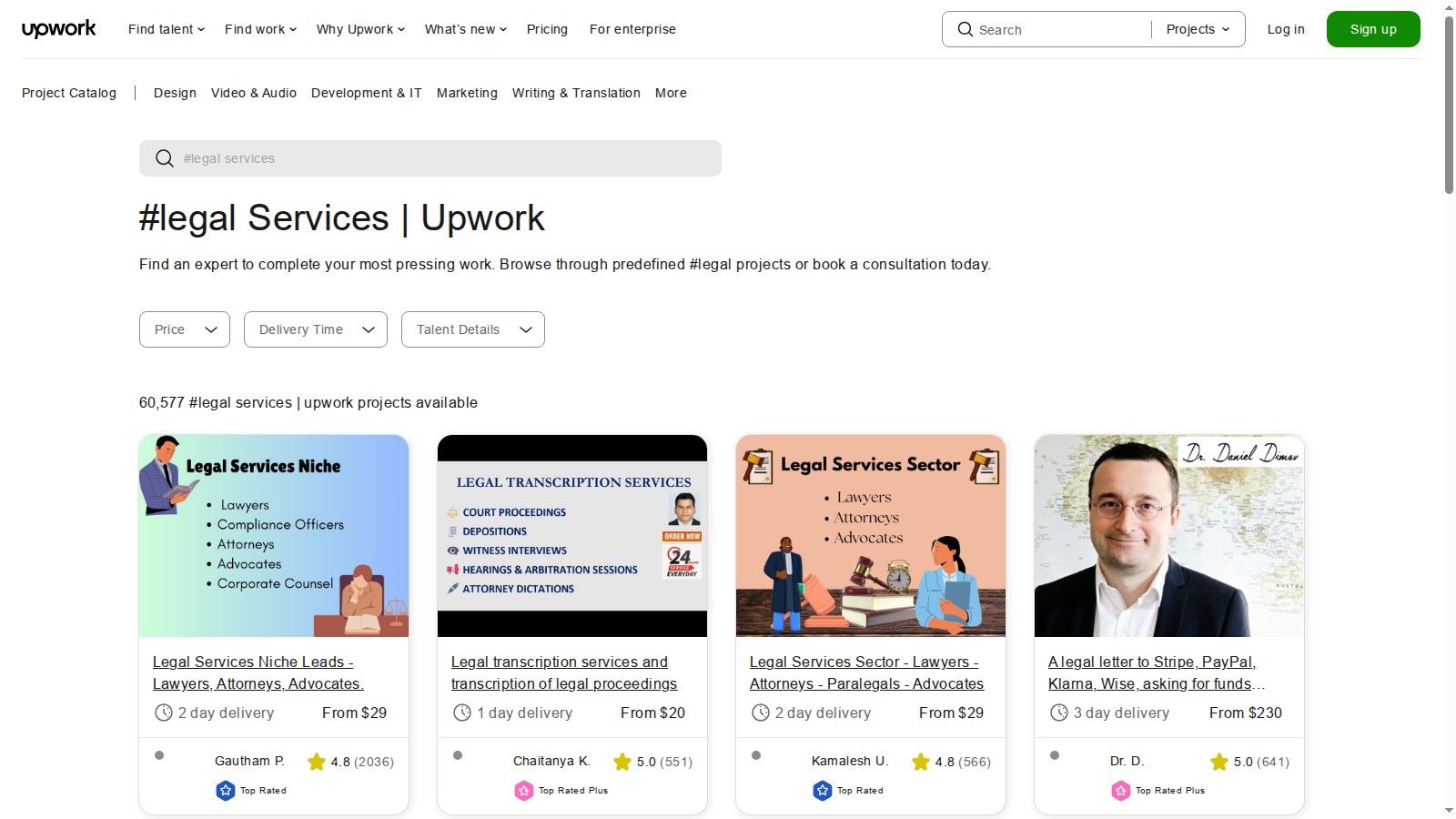
Why is it a contender? The sheer volume and variety of clients. You have complete control to build your profile, define your services, and set your rates. The platform’s integrated payment protection and invoicing system handles the financial logistics, letting you focus on the legal work. Succeed here, and you can build a steady stream of business.
Website: https://www.upwork.com/services/browse/legal-services
LinkedIn Jobs isn't a niche legal platform, but ignoring it is a mistake. It’s the 800-pound gorilla of professional networking, and its sheer volume makes it an essential tool for finding freelance attorney jobs. It aggregates a massive inventory of contract, temporary, and fractional roles. You won't find the curated, project-based experience of a legal-specific marketplace here. You get a sprawling, filterable database of opportunities.
Its real power is in scale and networking. To have any chance, you must optimize your LinkedIn profile to attract recruiters. Don't think of it as a passive board; it's an active hunting ground where you can directly engage with hiring managers and leverage your network for a warm intro. That intro is often the only thing that separates you from the other 200 applicants.
Website: https://www.linkedin.com/jobs/contract-attorney-jobs
| Service | Primary focus | Vetting & quality | Speed & cost | Best for / Unique selling point |
|---|---|---|---|---|
| HireParalegals | On-demand remote paralegals, legal assistants & junior attorneys for U.S. firms | Rigorous 4‑step vetting; 10k+ pre‑vetted profiles, video+CV, avg 4+ yrs exp | Custom shortlists in ~24 hrs; salaries from ~ $10/hr; claims up to ~80% payroll savings | Solo to mid‑size firms and corporate legal teams — exclusive US focus, AI+human matching, payroll/compliance for LATAM |
| LAWCLERK | Flat‑fee freelance attorneys for discrete projects | Two‑tier conflicts checks, platform NDA, vetted freelancers | Project‑based marketplace; flat‑fee pricing (take‑home visible) | Firms needing attorney‑level project work — strong ethics/workflow and secure tools |
| Hire an Esquire | Nationwide contract attorneys & paraprofessionals | Curated network with match recommendations and vetted opportunities | Employers pay to post; platform provides posting metrics and time‑to‑offer data | Employers seeking contract attorneys via Major, Lindsey & Africa — transparent posting performance |
| UpCounsel | Business legal marketplace for SMBs/startups | Application screening for attorneys; curated network | Attorneys set own rates; platform takes transaction fee; higher‑rate engagements common | Attorneys serving SMBs/startups — control over rates, client base for business matters |
| Priori Legal | Curated outside counsel & flex/secondment talent (US + global) | Curated matches, data‑rich profiles; no public bidding | Selective vetting can limit immediacy; pricing varies by match | In‑house legal teams needing senior/flex‑GC caliber counsel and cross‑border coverage |
| Axiom Law | On‑demand in‑house counsel, secondments, project teams for enterprise | Rigorous screening; large talent pool (14k+) | Structured engagements; rates set per client/program | Enterprises and experienced attorneys — strong brand recognition and steady pipelines |
| Legal.io | Talent network & jobs board with salary benchmarking | Vetted listings + market data and community verification | Varies by listing; some postings include transparent ranges | Tech/in‑house‑leaning freelance counsel and legal ops — salary benchmarking and community layer |
| Elevate Flex | Flexible resourcing: contract lawyers, review teams, secondees | Large screened community (18k+); selective vetting for enterprise roles | Résumés ~12 hrs; review teams ~48 hrs; client‑specific rates | Enterprises needing rapid staffing and recognized flexible‑resourcing expertise |
| Consilio | eDiscovery & document‑review contract attorneys and reviewers | Massive reviewer pool (17k+), multilingual, 24/7 operations | Scale enables steady review work; pay varies by market | Attorneys seeking document review / multilingual projects — large scale, continuous ops |
| Latitude Legal | Flexible staffing for peer‑level attorneys (BigLaw/in‑house backgrounds) | High‑touch matching by former practicing attorneys; W‑2 options | Competitive pay; benefits available on many assignments | Experienced attorneys seeking part‑time/full‑time contracts — Chambers‑ranked, benefits offered |
| Upwork (Legal) | General freelance legal services marketplace | Open marketplace, profile & review driven vetting | Immediate access to global clients; clear freelancer fee structure | Freelancers building SMB/startup clients — massive demand and platform tools |
| LinkedIn Jobs | Broad job board for contract, temp & remote legal roles | Employer‑posted roles; vetting varies; network leverage for warm leads | Job alerts & filters; pay often undisclosed; application volume high | Broad job search and recruiter engagement — largest professional network |
So, there you have it. A no-BS tour of the digital landscape for freelance attorney jobs. We've dissected everything from the high-end, bespoke matchmaking of Axiom and Priori to the Wild West of Upwork. If you’ve been clicking through tabs and feel a bit of analysis paralysis, that’s normal. The sheer volume of options can feel like trying to pick a winning stock.
But here’s the reality check: there is no single "best" platform. Anyone who tells you otherwise is selling something. The right choice is less about a platform’s marketing copy and more about a brutally honest assessment of your own goals, experience, and tolerance for hustle.
Before you start building profiles and firing off applications, stop and think. The biggest mistake attorneys make is treating this like a traditional job search, spraying resumes across every platform hoping something sticks. That's a recipe for burnout.
Instead, ask yourself a few direct questions:
Once you've clarified your goals, the path becomes clearer. If you're an Am Law 100 alum with a pristine resume seeking sophisticated in-house gigs, focusing your energy on Axiom and Priori Legal is the smart play. If you're a nimble attorney who loves the thrill of landing your own clients, marketplaces like UpCounsel and LAWCLERK offer more direct control.
The key takeaway is this: these platforms are powerful tools, but they are not magic wands. They provide access, credibility, and a framework for finding freelance attorney jobs, but they won’t do the hard work for you. Your success still hinges on your ability to market yourself, deliver exceptional work, and build relationships.
Think of it this way: the platform is the venue, but you are the main act. Choose the stage that best showcases your unique talents. Don't just sign up; strategize. Pick one or two platforms that align with your brand, build a profile that screams "I solve this specific problem," and then work the system. This isn't just about finding a gig; it's about building your own legal enterprise, one project at a time. Now, go build it.